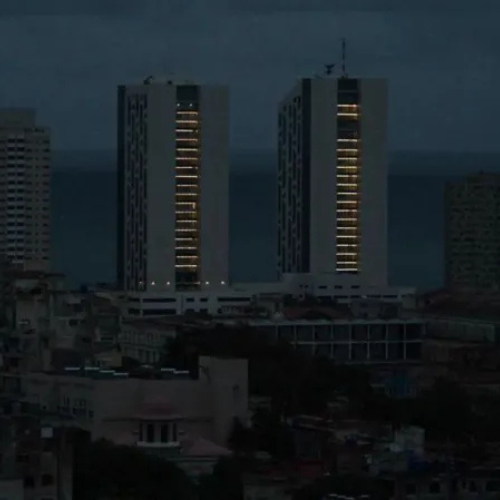The entire country of Cuba experienced a devastating blackout when one of its main power plants, the Antonio Guiteras Thermoelectric Power Plant, suddenly went offline. This unexpected shutdown caused a complete collapse of the island’s power system. The Ministry of Energy and Mines (MINEM) quickly assured the public that teams were working around the clock to restore electricity.
Cuban President Miguel Díaz-Canel promised that the government was making the restoration of power a top priority, saying, “There will be no rest until power is fully restored.” By that evening, MINEM announced progress, with small amounts of electricity restored in some areas thanks to the efforts of the gas company ENERGAS and various micro electric systems.
However, officials stressed that restoring power would take time. Engineer Lázaro Guerra Hernández from MINEM explained that reconnecting the entire grid requires careful steps to avoid further issues. He added that parts of the country were being supplied with energy from other plants, such as Santa Cruz del Norte and the Mariel floating power plant.
Ri Il-kyu’s Defection: Sinister Mission to Sabotage South Korea-Cuba Relations Ended
U.S. Blockade Behind Power Crisis
This blackout isn’t an isolated incident but rather part of a much larger problem for Cuba. The country has long struggled to keep its electrical grid running efficiently, largely due to the ongoing U.S. blockade. For decades, the economic restrictions imposed by the United States have severely limited Cuba’s access to essential fuel and energy resources.
Alfredo López Valdés, the General Director of the National Electric Union (UNE), had already warned about the critical state of the island’s energy system just a day before the blackout. He explained that over half of the issues in Cuba’s electrical grid are caused by a fuel shortage, made worse by the U.S. sanctions that restrict the country from purchasing fuel on the global market.
Chinese Companies Supporting Russian Drone Series “Garpiya” Sanctioned by US
The blockade has far-reaching effects. Since the U.S. controls much of the global financial system, it has been able to prevent other countries and companies from selling fuel to Cuba. For example, in 2019, the U.S. government sanctioned a Cuban company, Panamericana Corporation, which was buying liquefied natural gas for the island. This move was part of an effort to pressure Cuba because of its political ties with Venezuela.
Since then, it has faced even more difficulties in securing fuel, leading to rationed electricity and frequent blackouts. The current outage is a direct result of this ongoing fuel shortage, which has been made worse by the U.S. blockade.
Aliia Roza Unveils the Intriguing World of Sexpionage and Betrayal
Activists Call for an End to the Blockade
In response to the blackout, activists from around the world are renewing their calls for the U.S. to lift its blockade on Cuba. They argue that the sanctions are causing needless suffering for the Cuban people, preventing the island from obtaining the fuel and machinery needed to maintain its power plants.
One organization, the Party for Socialism and Liberation, spoke out against the U.S. blockade in a post on X (formerly known as Twitter). They stated, “End the U.S. blockade NOW! The U.S. blockade has led to a nationwide blackout and a crisis in the country’s electrical grid.” They emphasized that Cuba is being denied access to crucial fuel shipments and necessary mechanical parts for its power plants.
Manolo De Los Santos, director of the People’s Forum, also condemned U.S. policy toward the island. He criticized President Biden for continuing the sanctions put in place by former President Trump. Despite expectations that the Biden administration might ease restrictions, no significant changes have been made. This has only worsened the country’s ability to recover from these frequent power crises.
The U.S. blockade goes beyond limiting fuel imports. It costs Cuba an estimated 13 million dollars a day, cutting the nation off from vital resources like medicine, food, and spare parts. These economic restrictions have made daily life difficult for the people of Cuba, as they face shortages of basic necessities and endure frequent power outages.
The recent blackout is just another reminder of how deeply the blockade affects ordinary Cubans. Activists continue to push for change, demanding an end to the sanctions that have left Cuba struggling with ongoing blackouts and a weakened economy.


